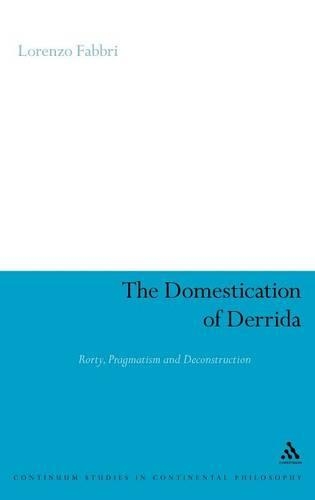
The Domestication of Derrida: Rorty, Pragmatism and Deconstruction
(Hardback)
Publishing Details
The Domestication of Derrida: Rorty, Pragmatism and Deconstruction
By (Author) Dr Lorenzo Fabbri
Bloomsbury Publishing PLC
Continuum International Publishing Group Ltd.
8th June 2008
United Kingdom
Classifications
Tertiary Education
Non Fiction
194
Physical Properties
Hardback
160
Width 156mm, Height 234mm
Description
In The Domestication of Derrida, Lorenzo Fabbri argues that Rortya's powerful reading protocol is motivated by the necessity to contain the risks of Derridaa's critique of Western philosophy and politics. Rorty claims that Derrida reduces philosophy to a production of private fantasies that do not have any political or epistemological relevance. Fabbri challenges such an aberrant appropriation by investigating the two key features of Rortya's privatization of deconstruction: the reduction of deconstructive writing to an example of merely autobiographical literature; and the idea that Derrida not only dismisses, but also mocks the desire to engage philosophy with political struggle. What is ultimately questioned in The Domestication of Derrida is the legitimacy of labelling deconstruction as a post-modern withdrawal from politics and theory. By discussing Derridaa's resistance against the very possibility of theoretical and political ascetism, Fabbri shows that there is much more politics and philosophy in deconstruction than Rorty is willing to admit.
Reviews
'Fabbri's important book demands serious attention not only from those interested in the relation between Jacques Derrida and Richard Rorty, but from those interested in thinking together a future radical politics.' - Postmodern Culture
"...carefully seeks to understand and contextualize Rorty's pragmatist reappropriation of Derrida's thought...a provocative and essential resource." French Studies, 2009
"...the book provokes long reflection on the basic fruitfulness of Rortys position, and this alone is a clear virtue." Aaron James Landry, Symposium, January 2010
Fabbri makes a successful case in defending Derrida against Rorty's criticism... [his] book merits attention as one of the few attempts to mark the interface between pragmatism and deconstruction. -- The European Legacy, Vol. 16, No. 3
Author Bio
Lorenzo Fabbri is a Sage fellow in the department of Romance Studies at Cornell University, USA.
